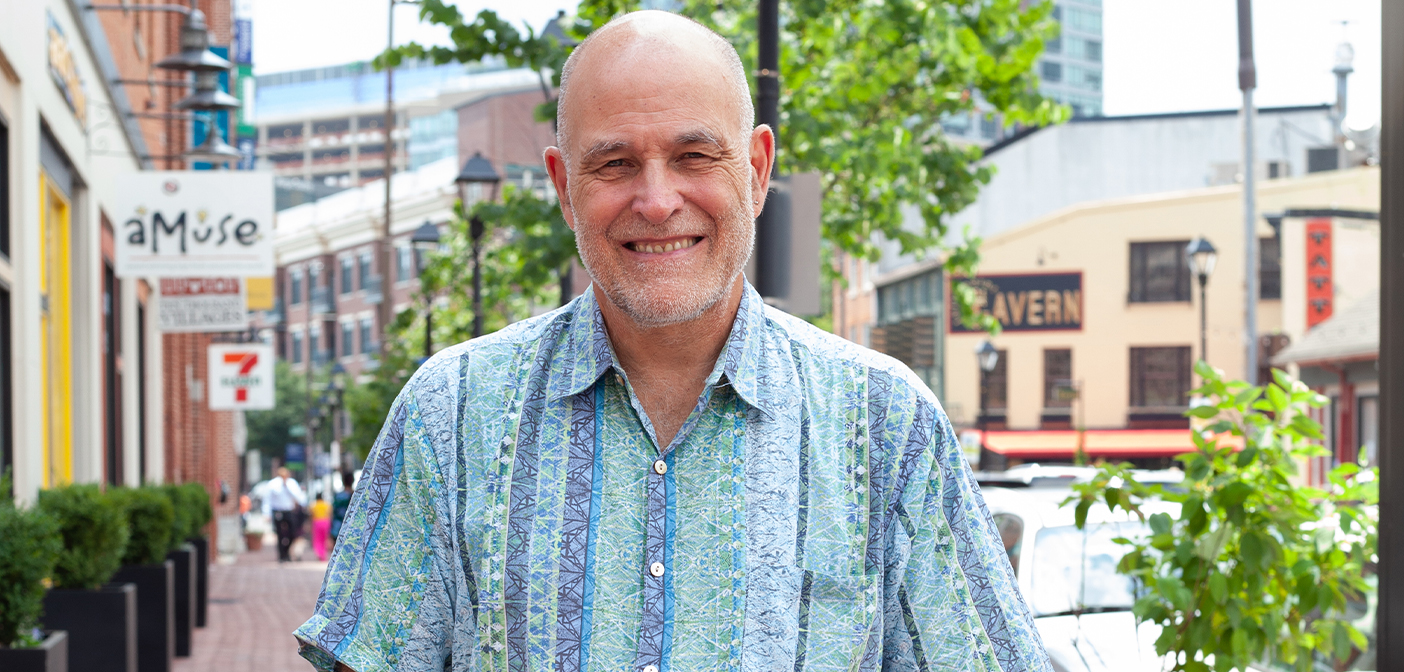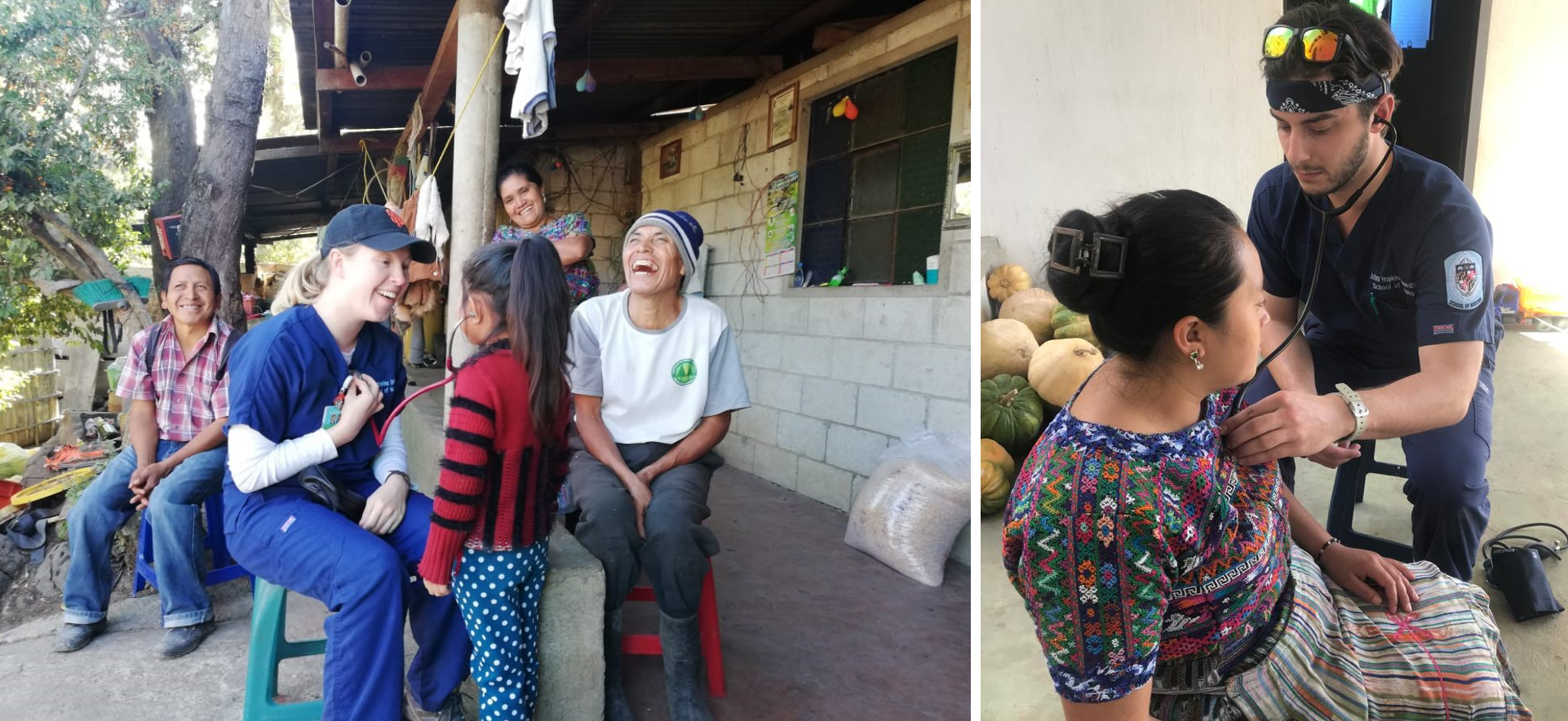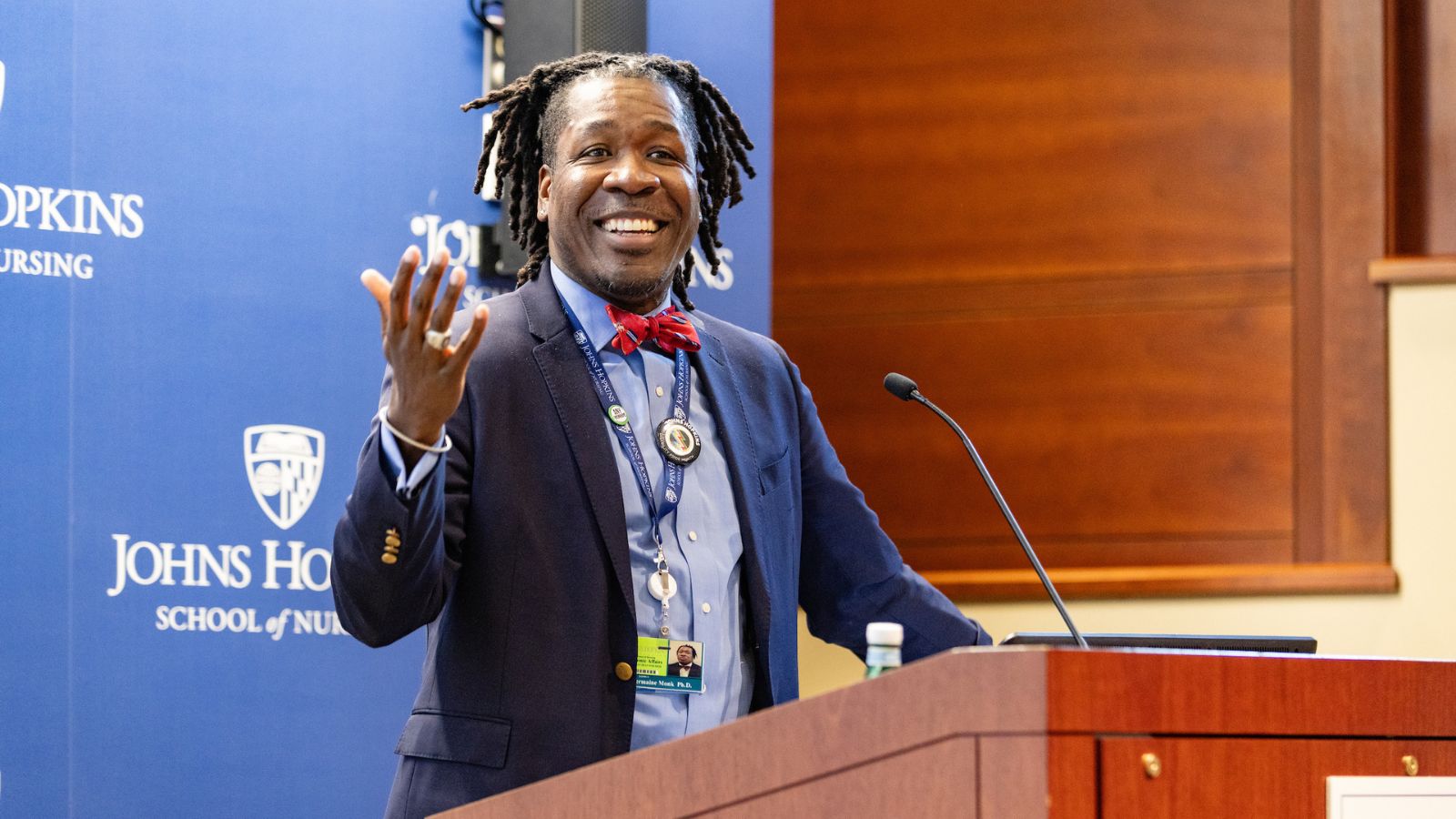By Maryalice Yakutchik
Jhpiego’s nurse leader Peter Johnson dishes about a big meeting, year, and honor—and the biggest nursing report ever
Peter Johnson agreed to a late-day interview and showed up smiling, as if he hadn’t just flown from Singapore to Baltimore, with a stop at World Health Organization (WHO) headquarters in Geneva. Jhpiego’s senior director of nursing and midwifery is unfazed by time zones. Johnson’s very first day on the job in 2006 found him flying to Uganda straight from a Disney vacation with his family. It set the tone for a Jhpiego career spent largely on the road, visiting many of the 40-plus countries served by an organization that he proudly notes is the only nurse-led NGO operating worldwide. He admires Leslie Mancuso’s habit to identify as a nurse first, before introducing herself as Jhpiego’s president and CEO.
We dispensed with small talk: “How are you?” “Tired.”
Then I lobbed a biggie to rev him up.
MY: Would it be possible, even if you weren’t jet-lagged, to imagine a more monumental moment to be a nurse?
PJ: Not a chance.
[A bit of context: Johnson has just returned from the International Council of Nurses Congress where 5,300 delegates were buzzing about the expanded role of the nurse—a concept almost as near and dear to Johnson’s heart as his grandkids, of which there are four.]
MY: Explain why you’re not a fan of task shifting, but are a proponent of expanded roles.
PJ: I’d love people to talk more about expanding scope of practice, as opposed to task shifting—which sounds like the role really belongs to somebody else, but a nurse’ll do in a pinch.
One of the first things I worked on at Jhpiego were training materials for voluntary medical male circumcision. At the time, the WHO didn’t want nurses to do anything other than counseling. They didn’t want them in the OR. Fast forward to today: Who’s doing many of the circumcisions, many of the surgeries, and doing them independently? Nurses.
MY: Sounds like you knew all along that nurses’ roles in HIV treatment and carewould likely expand, and that nurses would step up?
PJ: Right, but this happened because of supply and demand. Because of a dire need, people gave nurses the opportunity. And nurses performed well.
I’m tired of nurses being regarded as “good enough”—as opposed to them being thought of as the very best providers of care with an expanding scope of practice.
MY: You’re a nurse. And you’re a midwife and fellow for 20 years in the American College of Nurse Midwives. Just recently you were selected for induction as a fellow of the American Academy of Nursing—a recognition that, according to the AAN, “sets aside nursing leaders as the most highly distinguished within the profession and honors outstanding accomplishments that have significantly impacted healthcare.”
PJ: It’s an honor. The pinnacle of my career. I owe it to Jhpiego for offering me the platform to make successful contributions over the past 13 years. Jhpiego develops innovative, accessible, and cost-effective strategies to build and sustain a robust health workforce. We’ve invested in a three-year strategy aimed specifically at building the power and agency of nurses worldwide so they can maximize their contributions. So that they can lead. It’s pretty phenomenal.
MY: Pre-Jhpiego, you worked in both clinical practice and academia, right?
PJ: But it wasn’t until I stepped out of academia and started at Jhpiego that I had the opportunity to shape nursing education globally … in Ethiopia, Liberia, Botswana, Lesotho, Swaziland, Kenya, India, Myanmar. … There’ve been so many countries I’ve been able to advise and fully use my skill set.
MY: Having met, taught, and worked with nurses all over the world, is there a universality to the profession?
PJ: For sure. Nursing is first and foremost about caring and nurturing. It really doesn’t matter where you go in the world. Or if they are graduating with an associate’s degree or PhD. All of us 20 million nurses worldwide speak the language of caring and nurturing.
MY: The International Year of the Nurse and the Midwife will be in 2020. How do you intend to celebrate this 200th anniversary of the birth of Florence Nightingale?
PJ: Jhpiego is under contract with the WHO to support the State of the World Nursing Report which, as the first ever such report to focus on nursing, has a vast scope. We are collaborating with the team at WHO and the State of the World Nursing Report steering committee to collect data from 194 countries, analyze it, and write the report.
I am excited to be working with my colleague Nancy Reynolds at the Johns Hopkins School of Nursing as a partner on the State of the World Nursing Report. The School of Nursing has been an important WHO Nursing and Midwifery Collaborating Center for many years and as the current secretariat for the centers around the world, it has important reach and influence.
I’ll be celebrating when Jhpiego, with the WHO and global partners, unveils the release of that report in April 2020 on World Health Worker Day.
MY: Spoiler alert! Preview please?
PJ: It’s going to set the agenda for the next 10 years, positioning nurses front and center in efforts to meet the WHO’s triple billion goals, which include: 1 billion more people benefiting from universal health coverage, 1 billion more people better protected from health emergencies, and 1 billion more people enjoying better health and well-being, respectively.
The State of the World Nursing Report will inform a new strategy for nursing workforce development that ties to goals for universal health coverage. It aligns with Jhpiego’s priority initiatives, including those related to safe surgery, primary health care, malaria eradication, and HIV care and treatment. It’ll highlight the importance of nurses in making all these things happen.
MY: Final thoughts?
PJ: I hope nurses will be valued more, as a result of the State of World Nursing Report.
The nursing profession has grown up. But society hasn’t been paying attention. As a result, education and compensation for nurses are lacking. People still have this outdated image of nurses in hospitals, emptying bedpans and making beds. The fact is that nurses are on the front lines of eradicating diseases, of increasing access to care, and of preventing, diagnosing, and treating illnesses worldwide. The role they play in maintaining the health of people in their communities is big—and getting bigger!
Maryalice Yakutchik manages global communications for Jhpiego.

 Forging Policy: How Can Doulas Improve Black Maternal Health?
Forging Policy: How Can Doulas Improve Black Maternal Health? Guatemala Re-visited: Rainwater Project Shows Value of Service-learning Trips
Guatemala Re-visited: Rainwater Project Shows Value of Service-learning Trips You’re Welcome
You’re Welcome Forging Policy: Associate Dean Jermaine Monk and Education After Affirmative Action
Forging Policy: Associate Dean Jermaine Monk and Education After Affirmative Action Nursing Named Most Trusted Profession for 22nd Consecutive Year
Nursing Named Most Trusted Profession for 22nd Consecutive Year






